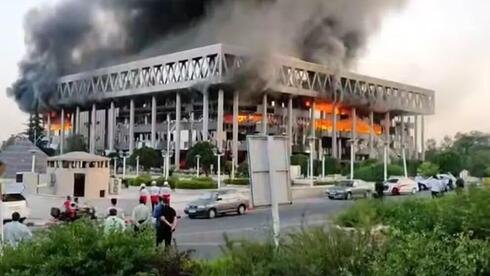The Israel Defense Forces (IDF) is operating on multiple fronts with remarkable success. The air defense system is performing under unprecedented pressure, intercepting thousands of rockets and drones with a multi-layered system that includes Iron Dome, David’s Sling, and Arrow. It is a first-rate demonstration of military prowess.
IDF launches major operation to disrupt Iranian ballistic missile attacks on Israel
(Video: IDF)
Above all, the close security and diplomatic cooperation with the United States—led by Presidents Biden and Trump—has strengthened both Israel's legitimacy and its operational freedom to respond, deter, and initiate.
Yet this very success should be a cause for concern
Israel has always excelled in times of crisis—but stumbles in times of quiet. When calm returns, vision, normalization, and strategic diplomacy often vanish. Time and again, enemies rebuild while Israel indulges in the illusion of peace. The problem is not one of security—but of leadership and morality. It is the sin of hubris: a political and military leadership intoxicated with temporary success, preferring hollow “enlightenment” and international PR over national responsibility, civilian safety, and long-term strategy.
Recent decisions by Prime Minister Netanyahu and IDF chiefs Herzi Halevi and Eyal Zamir—some backed overtly or tacitly by both Biden and Trump—will leave a mark on history. But triumph can quickly turn into overreach. Tactical victories alone cannot create strategic stability. What is needed is political courage: deep strategic thinking, institutional reform in defense and governance, and a genuine pursuit of regional normalization. Otherwise, Israel will continue to win battles—and lose the war.
 Prof. Assaf Meydani
Prof. Assaf MeydaniPhoto: Amit Strauss
The international response exposes an additional challenge. Leading media outlets, like the BBC, reflect a troubling narrative: blaming Israel for initiating escalation with Iran, accusing it of undermining potential U.S.-Iran diplomacy by acting too soon, and highlighting civilian casualties almost exclusively on the Israeli side of the equation. While global oil prices rise following the conflict, coverage treats Israeli strikes in Gaza as routine and unquestioned. Once again, international double standards and moral inconsistency are laid bare. Israel’s enemies use civilians as human shields, yet Israel is consistently cast as the aggressor. In today’s battles, narrative warfare matters as much as firepower.
This is a defining moment—not only militarily, but diplomatically. Can Israel learn, hold its strength, and remember that sometimes, quiet is more dangerous than fire?
Professor Assaf Meydani is a scholar of policy and law at Tel Aviv-Yaffo Academic College and the University of Oxford.



